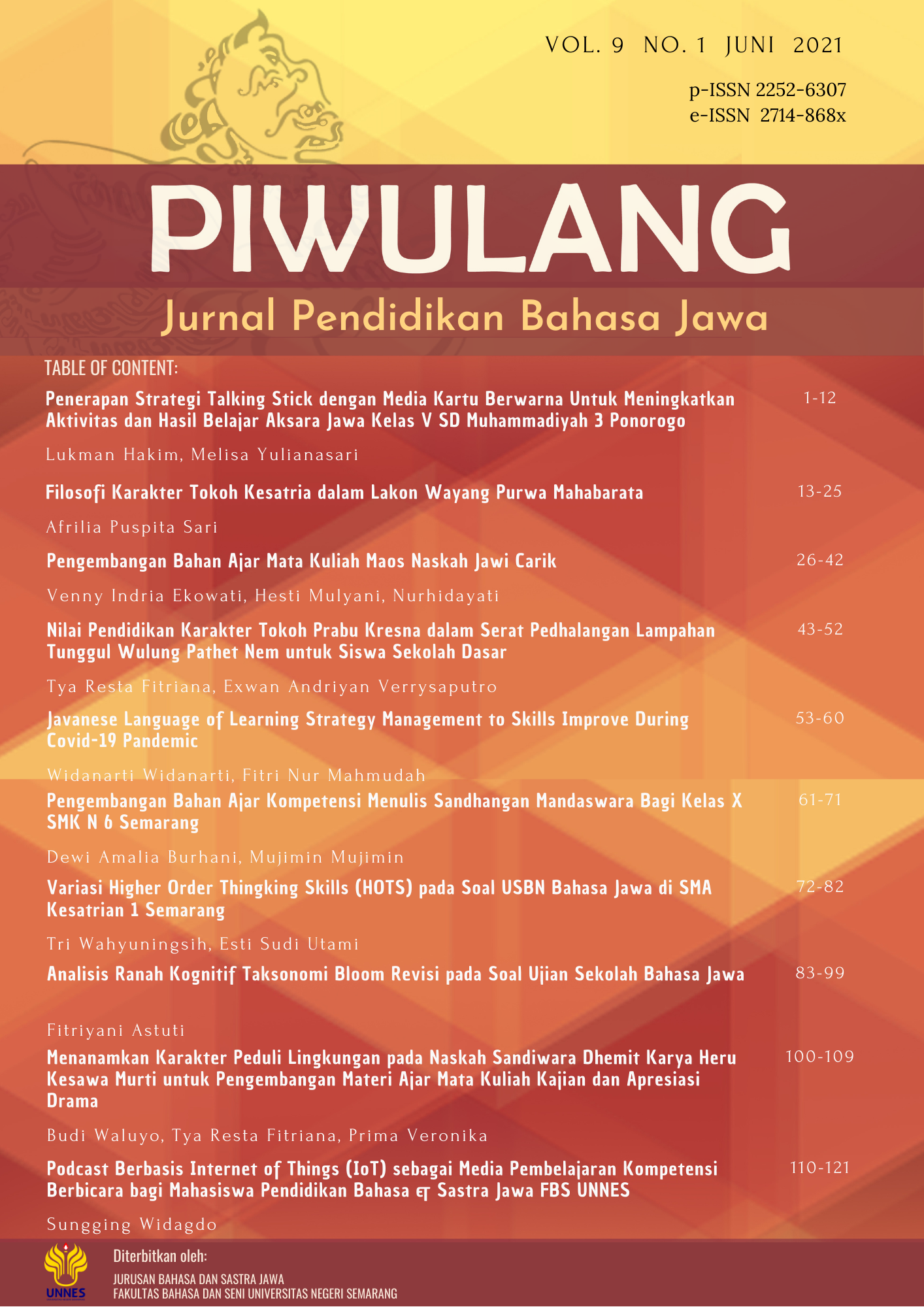Javanese Language of Learning Strategy Management to Skills Improve During Covid-19 Pandemic
##plugins.themes.academic_pro.article.main##
Abstract
The purpose of this study was to determine the management of Javanese learning strategies in improving student skills during the Covid-19 pandemic. The method used in this research is qualitative. The data source is high school students. Data collection techniques using participatory observation. This research procedure uses the Stake model. The results of this study provide information related to strategies that need to be carried out by teachers in Javanese language learning, starting from plan, strategy, practice, and evaluation. Each component has novelties and different findings in the context of Javanese language learning during the Covi-19 pandemic. This research is recommended for all teachers to be able to understand the strategies needed in the learning process during the Covid-19 pandemic and remotely so that student skills can improve and good learning outcomes.
##plugins.themes.academic_pro.article.details##
References
Aini, L. N., Wibowo, A., & Sriningsih, M. G. (2015). Linguistic analysis on javanese language selogudig-an dialect in selogudig, pajarakan, probolinggo. Jurnal Ilmiah Bahasa Dan Sastra, 2(2), 117–133.
Bundsgaard, J., & Hansen, T. I. (2011). Evaluation of learning materials: a holistic framework. Journal of Learning Design, 4(4), 31–46. https://doi.org/10.5204/jld.v4i4.87
Camerer, C. F. (2001). Strategic learning and teaching. (June 2014).
Danarwati, Y. S. (2019). Manajemen pembelajaran dalam upaya meningkatkan mutu pendidikan. Stia Asmisolo, 1(2), 1–18.
Defitrika, F., & Mahmudah, F. N. (2021). Development of life skills education as character building. International Journal of Educational Management and Innovation, 2(1), 116–135. https://doi.org/10.12928/ijemi.v2i1.3195
Fatimah, & Sari, R. D. K. (2018). Strategi belajar & pembelajaran dalam meningkatkan keterampilan bahasa. Jurnal Pendidikan Bahasa Dan Sastra Indonesia, 1(2), 108–113. Retrieved from https://jurnal.umj.ac.id/index.php/penaliterasi
Ilyas, M. (2017). Demystifying the Learning Management System ( LMS ): Journey from e- Learning to the Strategic Role Demystifying the Learning Management System ( LMS ): Journey from E-Learning to the Strategic Role. European Journal of Business and Management, 9(9), 12–18.
Mahmudah, F. N. (2016). Keefektifan Human Capital Investment Pendidikan Tenaga Kependidikan di Universitas Negeri Yogyakarta. Jurnal Akuntabilitas Manajemen Pendidikan, 4(1), 77–87. Retrieved from https://doi.org/10.21831/amp.v4i1.8201
Mahmudah, F. N. (2021). Self-innovation guru dalam meningkatkan prestasi siswa pada masa pandemi COVID-19. Ta’dibuna: JUrnal Pendidikan Islam, 10(1), 119–134. https://doi.org/10.32832/tadibuna.v10i1.4075
Mtebe, J. S. (2015). Learning Management System success: Increasing Learning Management System usage in higher education in sub-Saharan Africa. International Journal of Education and Development Using Information and Communication Technology, 11(2), 51–64.
Nurmasari, L., & Maret, U. S. (2019). Primary school students’ barriers on learning Javanese Language: a case study in Central Java, Indonesia. Advances in Social Science, Education and Humanities Research (ASSEHR), 158, 436–437. https://doi.org/10.2991/ictte-17.2017.103
Pemerintah Indonesia. Undang-undang republik indonesia nomor 20 tahun 2003 tentang sistem pendidikan nasional. , (2003). Jakarta Indonesia.
Pino-juste, M. (2017). Learning strategies in higher education. The International Journal of Learning, 17(1), 1–21. https://doi.org/10.18848/1447-9494/CGP/v17i01/46813
Ratnaningsih, E. (2009). Evaluating a classroom process. Journal of English Language, Literature, and Teaching, 1(1), 92–103.
Shi, H. (2017). Learning Strategies and Classification in Education. Institute for Learning Styles Journal, 1(19), 24–36.
Sir, C. (2013). Unmasking the capability of strategic learning: a validation study. The Learning Organization, 19(6), 497–517. https://doi.org/10.1108/09696471211266983
Stake, R. E. (2010). Qualitative research studying how thins work. New York: A Division of Guilford Publications, Inc.
Syafaruddin. (2019). Manajemen dan strategi pembelajaran. Medan: Perdana Publishing.
Tsai, M. (2009). The Model of Strategic e-Learning : Understanding and Evaluating Student e- Learning from Metacognitive Perspectives. 12, 34–48.
Veronika, P., Setiawan, B., & Wardani, N. E. (2016). The implementation of teaching-learning javanese language (fairy tale story) based on honest character education in curriculum 2013. Proceeding of 2nd International Conference of Arts Language and Culture, 1, 59–67.
